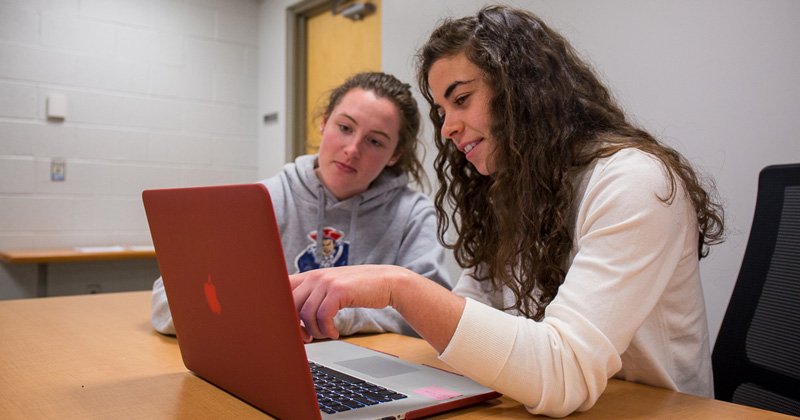


Excellence in behavioral health research
Photo by Aaron Davis April 27, 2018
Mackenzie Perkett wins Society of Behavioral Medicine’s Excellence in Research Award for work on sedentary behaviors
The University of Delaware’s Mackenzie Perkett received the 2018 Excellence in Research Award from the Society of Behavioral Medicine. The health promotion graduate student is investigating movement and sedentary behaviors in middle-age and older adults. In doing so, she’s trying to improve cardiovascular risk behaviors for this high-risk population. Sedentary behavior may be an important risk factor for cardiovascular disease — independent of physical activity levels.
“I am so honored that they chose me and my area of research. This is such an understudied area,” said Perkett, who will use the award funds in research recruitment.
As a UD undergraduate student, Perkett had an opportunity to work with Freda Patterson, an assistant professor in Behavioral Health and Nutrition (BHAN). The work inspired her to pursue a graduate degree.
“A key theme of Mackenzie’s work is that she is trying to find pragmatic and effective solutions to reduce cardiovascular disease risk,” Patterson said. “As an independent risk factor for cardiovascular disease, reduced sedentary behavior may be more amenable to long-term behavior change than increased physical activity in some populations.”
As a graduate student, Perkett has worked on Patterson’s analysis of the UK Biobank cohort data, collected with the aim of improving prevention, diagnosis and treatment of serious and life-threatening illnesses in a sample of about 500,000 British adults. The pair was interested in defining demographic risk profiles for different sedentary behaviors.
“We learned that there is a stark contrast between the types of people who engage in this behavior,” explained Perkett. “For example, we found that on average, adults in the sample accrued 4.76 hours of sedentary time but that males without a college degree spent 5.57 hours versus females who spent 4.35 hours being sedentary[per day]. We wondered about what social and environmental factors may be contributing to these behaviors, which was an awesome opportunity to turn into a master’s project.”
American adults spend an average of six to eight hours per day doing sedentary behaviors like sitting, watching TV or screen time on phones, tablets and computers. Curbing sedentary behavior is key because of its association with negative health effects — increased risk for cardiometabolic disease, metabolic syndrome, cardiovascular disease, cardiovascular mortality and type 2 diabetes mellitus. Often, this association is independent of physical activity levels. Over time, being sedentary too long can substantially contribute to poorer health outcomes.
“We’re investigating what it is about people’s environment’s that may contribute to differences in sedentary behavior,” said Perkett, who is scheduled to graduate with a master’s in health promotion in May. “I’m specifically interested in people’s home environment.”
Since individuals tend to have more control over their home environment compared to work, the home may be the practical place to reduce sedentary time during the day. Perkett is developing and conducting preliminary testing of a home audit tool for sedentariness. She will then measure the extent to which home environment features relate to total sedentary time. Perkett hopes her work will inform home-based interventions to reduce sedentary behavior and, ultimately, overall cardiovascular risk in adults.
“There is a large body of work on the role of built environment on physical activity,” Patterson said. “To some extent, Mackenzie's work parallels this by examining the extent to which home environment relates to accrued sedentary time at home.”
For individuals between the ages of 40- and 65-years-old who are interested in participating in the research study, please contact the research team at 302-831-4701.
Contact Us
Have a UDaily story idea?
Contact us at ocm@udel.edu
Members of the press
Contact us at 302-831-NEWS or visit the Media Relations website

